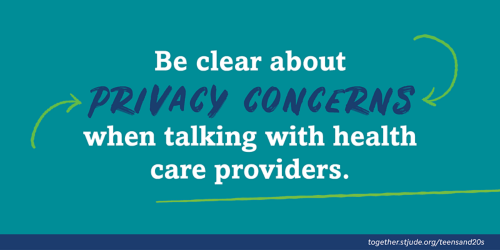Sex during cancer treatment is generally safe. However, there are some health concerns to consider. Talk to a care team member and ask questions before you take part in sexual activity. There are steps you can take to help keep you and your partner safe.
Know the risks of sex during cancer treatment
Sexual activity includes vaginal sex, oral sex, anal sex, and masturbation. In some cases, there is a risk of bleeding and infection due to certain cancers and treatments. Your sexual partner could also be exposed to chemotherapy drugs if you have sex while the drugs are still in your body fluids.
Factors to consider before having sex during cancer treatment include:
- Platelet counts: Make sure blood platelet counts are not too low. Platelets are blood cells that stick together (clot) to stop bleeding. When your platelet count is low, your body is less able to stop or control bleeding.
- Neutrophil counts: Understand if you are at higher risk of infection due to a low absolute neutrophil count (ANC). Neutrophils are a type of white blood cell that helps the body fight infection. Having a low ANC can increase your risk for problems such as yeast infections or urinary tract infections.
- Chemotherapy: Wait 3 days (72 hours) after chemotherapy before having sex. This is the average amount of time that chemo takes to leave the body. During that time, chemo drugs can be present in body fluids. Having any type of sex within 72 hours of chemo treatment may expose your partner to these drugs.
- Internal radiation therapy: Don’t have sex until radiation is out of your body. Sometimes radiation is placed inside your body during treatment. Examples include brachytherapy and radioisotope therapy. Your care team will let you know when it is safe to have sex after this type of therapy. There is no set time to wait to have sex after external beam radiation. This is radiation you get from a machine outside your body.
Using protection during sex
It is important to use a condom or other form of barrier protection during sex. This is especially important if your immune system is weak due to cancer or treatment. Sexually transmitted infections (STIs) are a risk for anyone who has unprotected sex. But the risk is even higher if your body cannot fight off infections as well.
People who have sex while getting cancer treatment should always use barrier protection, such as a latex condom or a female or internal condom. Consistently using condoms:
- Lowers the risk for sexually transmitted infections
- Protects your partner from the harmful effects of radiation therapy and chemotherapy
- Decreases the chance of unplanned pregnancy
Prevent pregnancy during cancer treatment
Unprotected sex could result in pregnancy during cancer treatment. If a pregnancy happens, doctors may stop therapy or change the treatment plan. This could affect your long-term health or chance of cure.
Being pregnant when you have chemotherapy or radiation has serious risks for an unborn baby. Chemotherapy and radiation could damage your sperm, eggs, or unborn baby. Your baby could have birth defects or other health problems.
It is strongly recommended to wait until after treatment to have a baby. If you are sexually active during treatment, always use a condom during sex.
Talk to the care team about treatment. Ask them how long you should wait before trying to get pregnant.
Be honest about your feelings
Many factors can affect feelings about sex during cancer treatment. You may have less desire for sex. Or it may be difficult to have an orgasm or erection. This is normal. Some people do not have problems having sex during and after cancer treatment. For others, feelings and changes during cancer treatment can make it hard to enjoy sexual intimacy.
Common barriers to sexual intimacy during cancer include:
- Feeling tired or nauseous
- Being self-conscious about body changes, such as hair loss, scarring, skin changes, or weight loss or gain
- Vaginal discharge, bleeding or discomfort due to vaginal dryness caused by treatment
- Inability to get or keep an erection due to treatments
- Pain from treatment or recent surgery
- Lack of desire or interest in sex
- Difficulty balancing a relationship with the stress and demands of cancer treatment
Ways to cope with these issues include:
- Wait to have sex until you feel physically and emotionally ready. Do not feel pressure to have sex. Cancer comes with many emotional and physical challenges. Wait until you are comfortable.
- Consider other ways to remain close. There are ways to be affectionate with your partner that don’t include sex. These can include kissing, cuddling, and massage.
- Talk with your care team. They can help you think about physical, emotional, and behavioral aspects to consider before having sex.
- Seek help from a specialist. Your care team can refer you to a specialist who can help with specific issues. Specialists may include a psychologist, physical therapist, or sexual therapist.
Talk with your care team about sex
It is important to talk to your care team about sexual health. Let a health care provider know about any new or unusual symptoms such as abnormal vaginal or penile discharge, itching, burning, or bumps or rash in the genital area. They can help you know if further evaluation or treatment might be needed.
You may be uncomfortable talking to your care team about sexual issues. Or you may not want to share the information with your parents or caregivers. Your care team will protect your privacy as much as they can.
Some states give health care providers the option to inform parents that their child is seeking services related to sexual health care. Be clear with your provider if you want your conversation to remain private.
Cancer treatment may affect your ability to have children. It is important to talk to your care team about this possibility before treatment starts. They can tell you how treatment could affect your fertility. You might be able to store some eggs or sperm before treatment, to try to have children later. Your care team can explain the risks and your options.
Take care of your health after cancer treatment
Let health care providers know about your medical history.
Create a survivorship care plan with your care team. Be sure to tell your health care provider about any sexual health side effects or concerns that you have.
Seek routine preventive health care.
Every sexually active woman should regularly see a gynecologist. A gynecologist is a doctor who specializes in female reproductive health. Each person’s recovery after cancer is different. It might take time for you to have your normal menstrual cycle (period). If you have not had a period within 6 months after treatment, talk to your health care provider. If you have vaginal dryness, a water-based lubricant may help. Water-based lubricants prevent bacteria growth.
Males should see a primary care provider for treatment with sexual problems or side effects. Side effects may include erectile dysfunction (ED), changes to the penis, changes in orgasm or ejaculation, and fatigue. In addition to the primary care provider, men may also see an endocrinologist, urologist, psychologist, or sex therapist.
Practice safe sex.
Always use barrier protection such as condoms during sexual activity to prevent pregnancy and STIs.
Your sex life may be different after treatment. Be honest with your care team and your partner to address any concerns.
Questions to ask your care team





